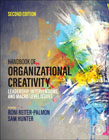
Handbook of Organizational Creativity: Leadership, Interventions, and Macro Level Issues
Reiter-Palmon, Roni
Hunter, Sam
In the last 20 years, research, theory and practice have focused on the need to improve creativity and innovation in organizations. In 2010, a survey of 1500 CEOs worldwide, conducted by IBM, listed creativity as one of the most important skills for managers and leaders of organizations. More recently, the World Economic Forum listed creativity, as well as related aspects such as critical thinking and complex problem solving, as the most important skills needed for the 21st century. This Second Edition of the Handbook updates coverage from recent research and adds topics not previously addressed including technology and creativity, artificial Intelligence work, a section on creativity within specific applied domains (e.g., engineering, science, therapy), and expands coverage of leadership to an entire section. The book includes individual, team, and organizational level factors, and includes organizational interventions to facilitate creativity (such as training) . The first volume on Individual and Group Level Processes introduces readers to the concepts of creativity in organizations. This will cover measurement and myths related to creativity, followed by individual and group influences on organizational creativity. Chapters focus on creative abilities and creative problem-solving processes, and individual difference variables such as motivation, affect, and personality. New chapters include the neuroscience of creativity, creativity and meaning, morality/ethicality and creativity, and creative self-beliefs. Group level phenomena will examine team cognition, team social processes, team diversity, social networks, and multi-team systems and creativity. Volume 2 on Leadership and macro influences on organizational creativity expands coverage of leadership to a full section. Coverage here includes different types and approaches to leadership such as transformational leadership, ambidextrous leadership leader-follower relations, and inclusive leadership. This is followed by organizational level influences such as organizational structure cultural and cross-cultural issues, and organizational factors influencing learning and change. A new chapter on gig and temporary workers is included here. A section on organizational interventions and field demands will include chapters examining, rewards, training, employee selection, performance management, and organizational development. New chapters here include Artificial Intelligence, technology, design thinking, and job requirements for creativity. The section on fields examines creative work in marketing, engineering, the arts, science, and medicine. Focuses on the key need to increase creativity and innovation in organizations Identifies the factors influencing organizational creativity Includes Individual, Group, and Organizational influences Specifies how these factors play out in specific subject domains Presents interventions to improve organizational creativity INDICE: Leadership Section 30. Transformational leadesrhip Herman Tse 31. leader-follower relations Charalampos Mainemelis 32. empowering leadership Xiaomeng Zhang 33. Ambidextrous leadership Kathrin Rosing 34. shared leadership Sam Hunter 35. Top Management Teams Hambrick 36. Inclusive leadership and creativity Jen Griffith Organizational level section 37. Structure Damanpour 38. Learning and Knowledge Drazin 39. Change cameron Ford 40. Cross cultural creativity Vlad Glaveanu 41. creativity and innovation Neil Anderson 42. Gig and temporary workers Melissa Keith 43. constraints Kelsey Medeiros Interventions Section 44. Rewards Byrne 45. Training and Development Alex McKay 46. Selection Jim Farr 47. Performance Management Ben Wigert 48. Organizational Development Min Basadur 49. Technology Josh Fairchild 50. Design thinking Scarlett Miller 51. AI Kelsey Medeios 52. Job requirements and job design Kerrie Unsworth Fields Section 53. Marketing Eric Shiu 54. Engineering Cropely 55. Arts Pablo Tinio 56. Science Jen Katz-Bouninconto 57. Medicine Vicki Kennel 58. Therapy Hod Arkibi 59. entrepreneurship Michael Frese 60. Malevolent creativity/terrorism/crime Sam Hunter Conclusion 61. The future of org. creativity research Mike Mumford 62. conclusion Roni Reiter-Palmon and Sam Hunter
- ISBN: 978-0-323-91841-1
- Editorial: Academic Press
- Encuadernacion: Cartoné
- Páginas: 610
- Fecha Publicación: 01/06/2023
- Nº Volúmenes: 1
- Idioma: Inglés
